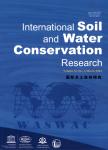Emerging pollutants in the environment:A challenge for water resource management
作者机构:Soil Physics and Land Management GroupWageningen University6708PB WageningenThe Netherlands RikiltWageningenThe Netherlands AgrosphereForschungszentrum JülichJülichGermany Joint Research CenterIspraItaly Laboratory of Toxicology and Environmental HealthIISPVUniversitat Rovira i VirgiliReusSpain
出 版 物:《International Soil and Water Conservation Research》 (国际水土保持研究(英文))
年 卷 期:2015年第3卷第1期
页 面:57-65页
学科分类:083002[工学-环境工程] 0830[工学-环境科学与工程(可授工学、理学、农学学位)] 08[工学]
主 题:Emerging pollutants Water resource management Monitoring Risk assessment Water policies
摘 要:A significant number of emerging pollutants(EPs)resulting from point and diffuse pollution is present in the aquatic *** are chemicals that are not commonly monitored but have the potential to enter the environment and cause adverse ecological and human health *** to the NORMAN network,at least 700 substances categorized into 20 classes,have been identified in the European aquatic *** light of their potential impact action is urgently *** this study,we present a concept that shows the current state of art and challenges for monitoring programs,fate and risk assessment tools and requirements for policies with respect to emerging pollutants as a base for sustainable water resource ***,methods for sampling and analysis are not harmonized,being typically focused on certain EP *** a number of known highly hazardous EPs detection limits are too high to allow proper risk *** other EPs such as microplastics method development is in its *** ultra-sensitive instrumental techniques should be used for quantitative determination of prioritized EPs in water,suspended matter,soil and *** on EPs and their metabolites properties that determine their fate in the environment are often not *** surveys on water quality often use different parameters for water quality assessment and often do not include EPs.A harmonized monitoring of surface and groundwater is not yet achieved and urgently *** component integrated into models assessing the fate of EPs in a multi compartment environmental approach are missing and must be *** main goal of risk assessment is the overall protection of ecological communities in the aquatic environment and human *** methods for assessing the cumulative risks from combined exposures to several stressors,including mixtures of EPs in a multi-scale approach are required.A combination of regulations and management meas



